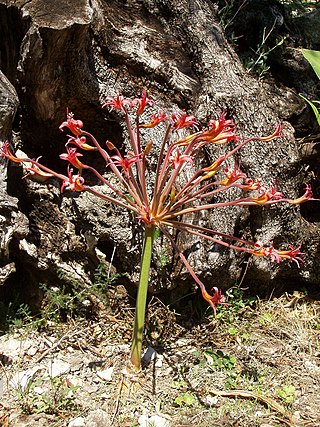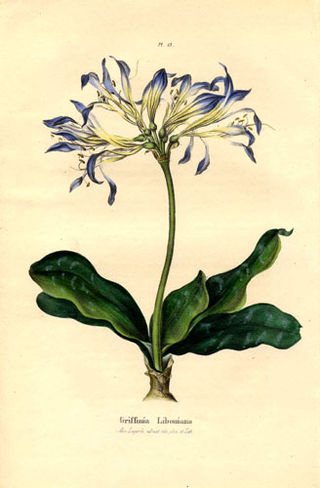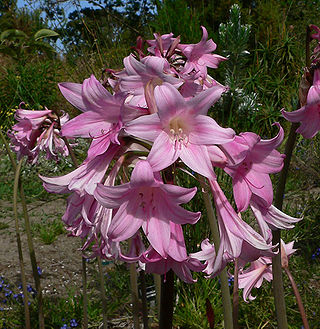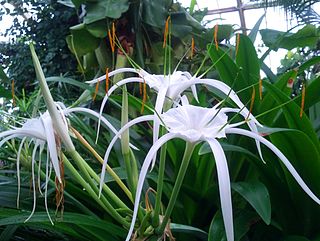
Brunsvigia is a genus of African flowering plants in the family Amaryllidaceae, subfamily Amaryllidoideae. It contains about 20 species native to southeastern and southern Africa from Tanzania to the Cape Provinces of South Africa.

Strumaria is a genus of African plants in Amaryllis family, subfamily Amaryllidoideae. The genus is known in nature only from South Africa, Lesotho and Namibia. Almost all species flower in the autumn and are cultivated as ornamental bulbous plants.

Ammocharis is a small genus from sub-Saharan Africa, in the family Amaryllidaceae which includes seven species distributed in Africa. The plant grows as above-ground bulb, preferring seasonally wet, hot, sandy soils and full sun.

Ammocharis longifolia is an African species of bulbous flowering plant in the family Amaryllidaceae. It has been placed as the only species, Cybistetes longifolia, in the monotypic genus Cybistetes.

The Griffineae is a tribe in the family Amaryllidaceae, subfamily Amaryllidoideae. It includes 3 genera with 22 species endemic to Brazil in South America. A typical character of the representatives of the tribe are the flowers - They are blue or lilac and collected into an umbel. Only the members of this tribe and the genus Lycoris are able to form flowers with such color in the whole subfamily Amaryllidoideae of Amaryllidaceae. The species in this group are typically perennial and produce bulbs. The leaves are green, with elliptical form in most of the cases but in some members, as in Worsleya, they are sword-shaped.

Albuca is a genus of flowering plants in the family Asparagaceae, subfamily Scilloideae. The genus is distributed mainly in southern and eastern Africa, with some species occurring in northern Africa and the Arabian Peninsula. Plants of the genus are known commonly as slime lilies.

Cryptostephanus is a genus of African plants in the family Amaryllidaceae, native to Kenya, Tanzania, Angola, Mozambique, Zimbabwe and Namibia. Its closest relative is Clivia, with which it shares some characters, including thick, fleshy roots, strap-like leaves, and fruit in the form of a berry.

Hessea is a genus of bulb-forming plants in the Amaryllis family native to Namibia and South Africa. The genus name commemorates C. H. F. Hesse (1772–1832), who resided in Cape Town from 1800 to 1817.

Pauridia is a flowering plant genus in the family Hypoxidaceae. It is native to southern Africa, and southern Australia. It has been introduced into New Zealand. The southern African species have been transferred from the genus Spiloxene.

Amaryllideae are a tribe of subfamily Amaryllidoideae. They are herbaceous monocot perennial flowering plants with a predominantly Southern African distribution, with the exception of the pantropical genus Crinum. They are generally treated as consisting of four subtribes. In addition to Crinum, other genera include Amaryllis, Boophone and Strumaria.
Ute Müller-Doblies is a German botanist with an interest in the systematics of Amaryllidaceae. She is currently at the Herbarium of the Technische Universität Berlin in collaboration with Dietrich Müller-Doblies (D.Müll.-Doblies.).

Pancratieae are a small European tribe of subfamily Amaryllidoideae, consisting of two genera including the type genus, Pancratium.

Eustephieae is a flowering plant tribe in the family Amaryllidaceae, subfamily Amaryllidoideae. It forms part of the Andean clade, one of two clades in The Americas.
Stenomesseae was a tribe, where it forms part of the Andean clade, one of two American clades. The tribe was originally described by Traub in his monograph on the Amaryllidaceae in 1963, as Stenomessae based on the type genus Stenomesson. In 1995 it was recognised that Eustephieae was a distinct group separate from the other Stenomesseae. Subsequently, the Müller-Doblies' (1996) divided tribe Eustephieae into two subtribes, Stenomessinae and Eustephiinae.

Eucharideae is a tribe of plants within the family Amaryllidaceae. It was augmented in 2000 by Meerow et al. following a molecular phylogenetic study that revealed that many elements of the tribe Stenomesseae segregated with it, rather than separately, and were subsequently submerged in it. Further revisions were made in 2020, when three genera were merged. It forms one of the tribes of the Andean subclade of the American clade of the subfamily.

Hymenocallideae is a tribe, where it forms part of the Andean clade, one of two American clades. The tribe was originally recognised by both Meerow (1995) and the Muller-Doblies' (1996). Its phylogenetic position within the Amaryllidoideae was established by Meerow et al. in 2000, while in-depth infratribal relationships were established in 2002.

Strumariinae is one of four subtribes within the tribe Amaryllideae, found in southern Africa.

Crininae is one of four subtribes within the tribe Amaryllideae, with a pantropical distribution (Crinum) and also sub-Saharan Africa.

Cliviinae is a small subtribe of Haemantheae, and therefore within the African clades of Amaryllidoideae. It consists of two genera, Clivia, and Cryptostephanus.
Strumaria massoniella is a species of flowering plant in the family Amaryllidaceae, native to the Cape Provinces of South Africa. It was first described in 1985 as Gemmaria massoniella. Its bulb is solitary. Like other members of the genus Strumaria it has star-shaped flowers. In the Northern Cape Province, it is found in sandy plains at an elevation of about 1,000 m (3,300 ft).


















